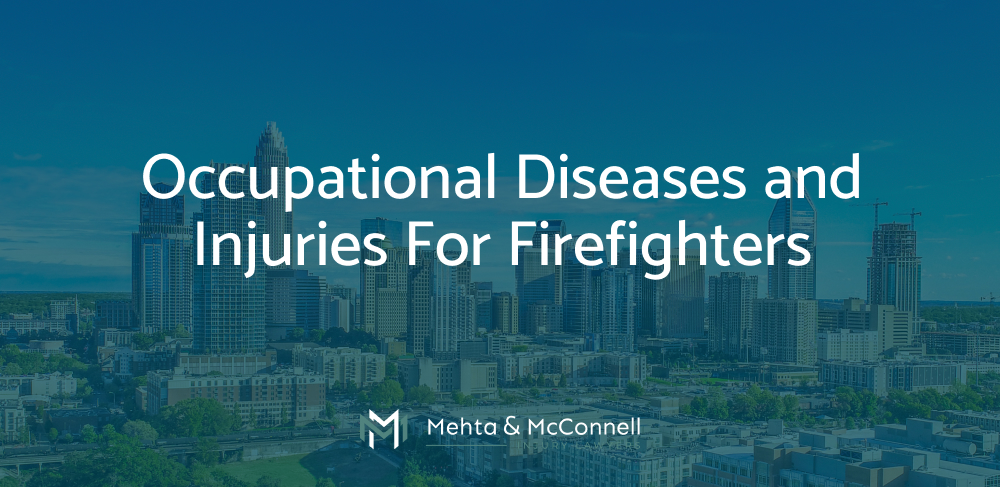
As first responders, firefighters put themselves in harm’s way for the public’s safety.
As a result, firefighters face unique risks of injuries and illness that should be covered by the state’s workers’ compensation system.
North Carolina’s workers’ compensation law covers firefighter occupational diseases under certain conditions.
In particular, a firefighter may be eligible for workers’ compensation benefits if they can prove that their work directly caused their occupational disease.
But making this connection can sometimes be a precarious process for a deserving firefighter under workers’ compensation law.
That is why our attorneys’ decades of experience can be crucial to your success in a workers’ compensation claim. We can help you win all the benefits you deserve.
Health Risks for Firefighters
Firefighting can significantly affect every firefighter’s health. Common causes of firefighter injuries include:
- Overexertion,
- Strain,
- Jumps,
- Slips,
- Falls, and
- Exposure to fire, smoke, or chemicals.
Many of the above causes lead to acute, firefighting-related injuries like burns, cuts, and broken bones.
But these causes can also lead to compensable firefighter occupational diseases, especially when there is continuous exposure to harmful substances and stress on the job.
Firefighting and Chronic Diseases
According to the American Lung Association, firefighters are at an increased risk of chronic airway diseases because their job requires them to be around the following hazardous substances:
- Cyanide,
- Carbon monoxide,
- Diesel exhaust,
- Asbestos,
- Benzene, and
- Polycyclic aromatic hydrocarbons.
These chemicals and firefighter work have been connected to the following ailments:
- Lingering cough,
- Lung cancer,
- Asthma,
- Bronchial cancer,
- Chronic interstitial disease,
- Allergies,
- Hoarseness,
- Autoimmune diseases, and
- Constrictive diseases of the respiratory system.
To receive workers’ compensation benefits for one of these conditions, you need a solid diagnosis from a medical professional and medical or scientific information that can prove that your exposure to harmful substances on the job caused your condition.
At Mehta & McConnell, we can put you in touch with the right experts and gather the most convincing information to prove your case.
What Workers’ Compensation Benefits Are Available to Me?
Under North Carolina’s workers’ compensation law, firefighters who suffer work-related injuries or occupational diseases may be eligible to recover various benefits to help them with their symptoms and any resulting inability to work.
The specific benefits available to you in a workers’ compensation case depend on the nature and severity of your injury or condition.
Benefits typically available in North Carolina workers’ compensation cases include the following.
Medical Treatment
Workers’ compensation covers the reasonable and necessary healthcare costs related to the treatment of your work-related injury or illness.
This includes doctor visits, surgeries, medications, rehabilitation, and any other medical services required for recovery.
Temporary Total Disability (TTD)
If you are unable to work while recovering from your injury, you may be entitled to receive TTD benefits.
These benefits are typically two-thirds of your average weekly wage and, paid during the period of temporary total disability.
Temporary Partial Disability (TPD)
If you can return to work but not at full capacity or with lower wages due to your work injury, you may be eligible for TPD benefits.
The amount of your TPD payments is typically two-thirds of the difference between your post-injury and pre-injury average weekly wages.
Permanent Partial Disability (PPD)
If you have sustained a permanent impairment but can still work, you may receive PPD benefits. The amount is determined by the extent and nature of your impairment.
Permanent Total Disability (PTD)
In cases of a severe permanent disability that renders you unable to perform any gainful employment, PTD benefits may be awarded.
PTD payments are typically two-thirds of your average weekly wage and paid for the duration of your disability.
Vocational Rehabilitation
In some cases, you may have a right to receive vocational rehabilitation services to help you return to suitable employment after recovering from your injuries.
Death Benefits
If a work-related injury or illness results in the death of a worker, their dependents may be able to recover death benefits, including compensation for funeral expenses and ongoing financial support.
The benefits available in a workers’ compensation case vary based on the specific circumstances of the claimant.
You can get the most out of the workers’ compensation system in your case when you speak to a knowledgeable attorney about the details of your injury and the complications you have faced since developing a work-related condition.
We Can Help Make Sure the System Takes Care of You
When you fight for your rights in a workers’ compensation claim, you are fighting against insurance companies.
At Mehta & McConnell, we not only have 30 years of combined experience, but we also have past experience working for workers’ compensation carriers.
This means that we know the tactics the insurance carriers employ and how to defeat them.
If you need a seasoned and effective advocate in your corner, you can call us at 980-294-4074 or contact us online.

